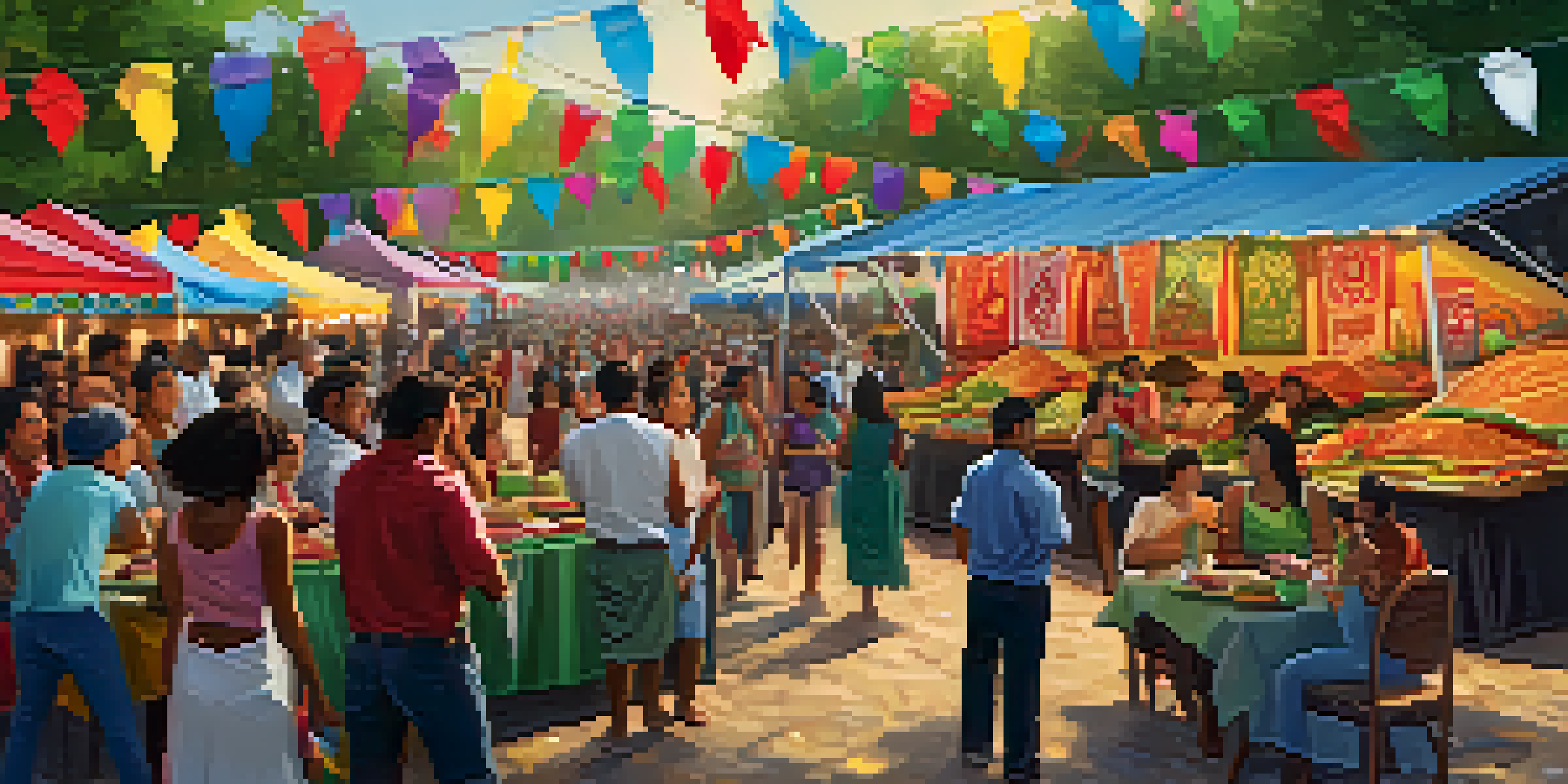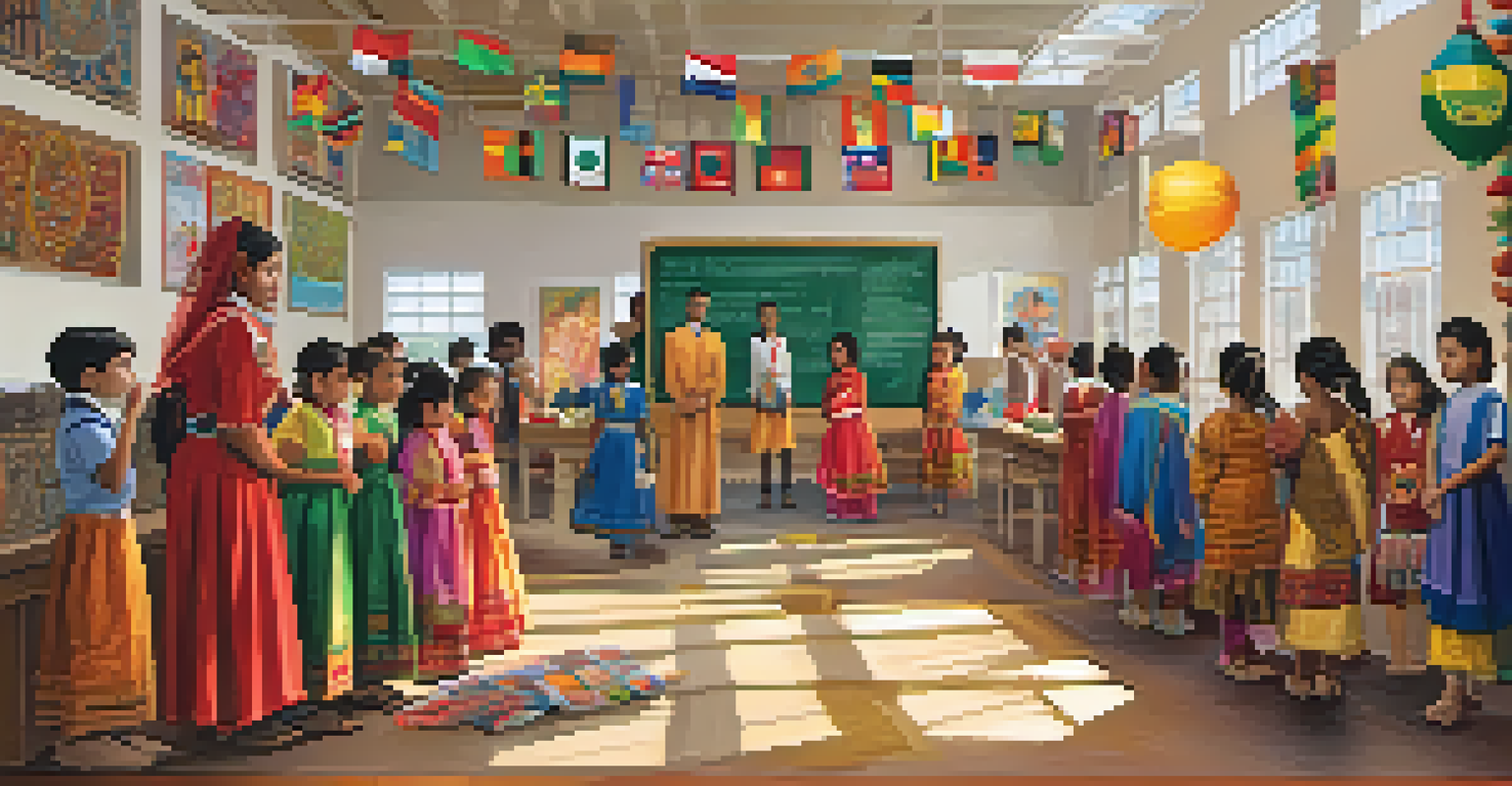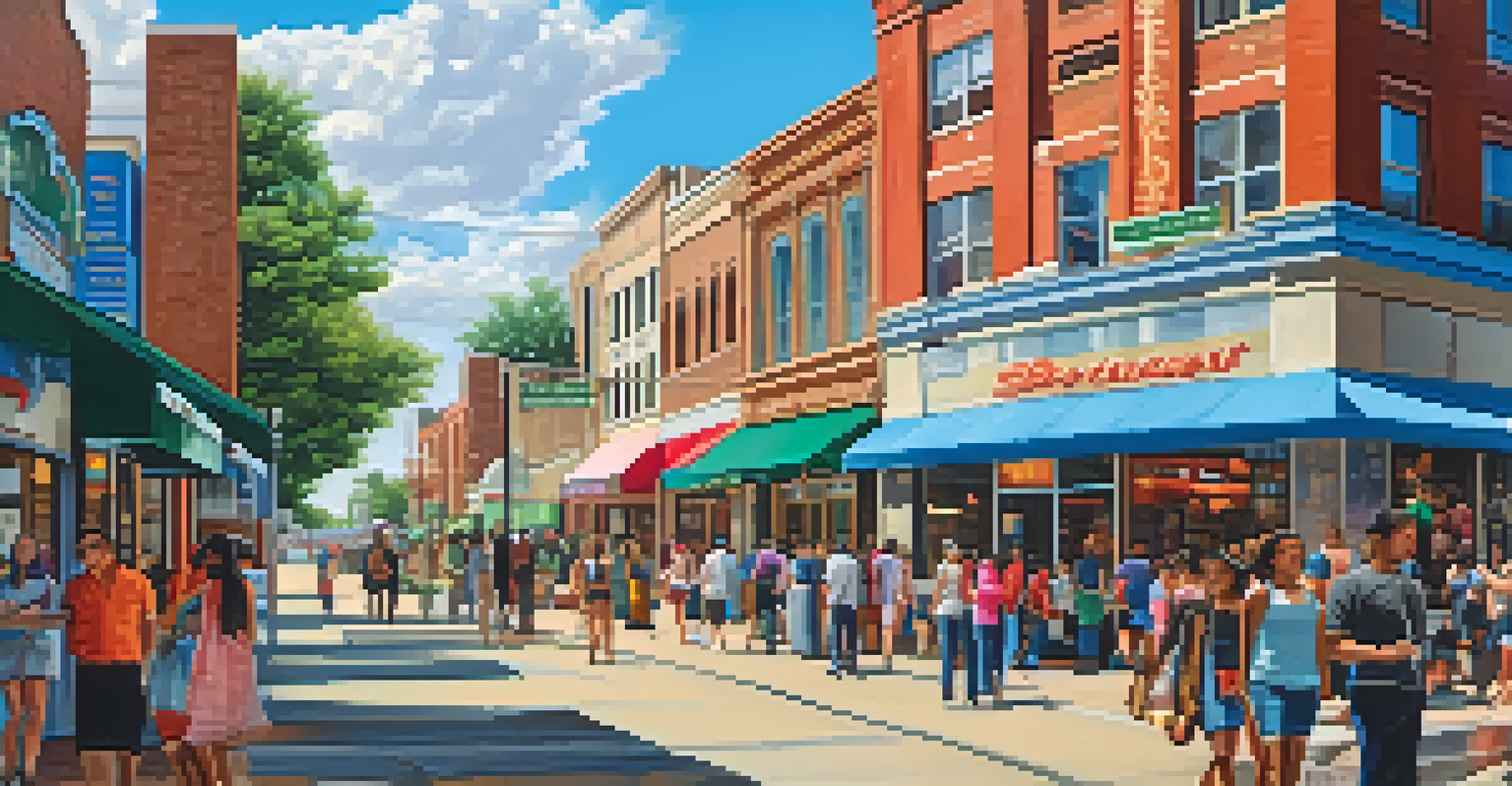Understanding the Impact of Cultural Exchanges in Dallas

What Are Cultural Exchanges and Their Importance?
Cultural exchanges are interactions between people from different backgrounds that promote understanding and appreciation of diverse traditions. They often involve sharing art, music, food, and customs, creating a vibrant tapestry of experiences. In a city like Dallas, known for its rich cultural diversity, these exchanges play a crucial role in fostering community bonds and enhancing social cohesion.
Diversity is the one true thing we all have in common. Celebrate it every day.
Imagine attending a festival where you can taste dishes from around the world, listen to global music, and engage in traditional dance. These events not only provide entertainment but also educate attendees about different cultures, breaking down stereotypes and building empathy. This is the essence of cultural exchanges—they turn strangers into friends and foster a spirit of collaboration.
Ultimately, cultural exchanges contribute to a more inclusive society, where everyone feels valued and heard. In Dallas, this means a thriving, interconnected community that celebrates its differences, creating a sense of belonging for all residents.
Dallas: A Melting Pot of Cultures
Dallas is often described as a melting pot, thanks to its diverse population. With residents hailing from various corners of the globe, the city offers a unique blend of traditions and perspectives. This diversity is not just a statistic; it shapes the very identity of Dallas and influences everything from its culinary scene to its art and music.

For instance, you can find authentic Mexican tacos alongside Vietnamese pho on the same street. This culinary fusion is a testament to how cultural exchanges enrich the local gastronomy, inviting residents and visitors alike to savor the flavors of the world. Such experiences foster curiosity and encourage conversations between people from different backgrounds.
Cultural Exchanges Foster Community
Cultural exchanges in Dallas promote understanding and appreciation of diverse traditions, strengthening community bonds.
Moreover, this cultural mosaic fosters innovation and creativity. When diverse ideas and experiences collide, they often lead to new artistic expressions or entrepreneurial ventures, making Dallas a vibrant hub for cultural and economic growth.
The Role of Festivals in Cultural Exchange
Festivals are a cornerstone of cultural exchange in Dallas, offering a platform for communities to come together and celebrate their heritage. Events like the Dallas International Film Festival and the State Fair of Texas showcase the city’s diverse cultural landscape, attracting participants and audiences from various backgrounds. These gatherings provide an opportunity for cultural sharing that goes beyond mere observation; they invite active participation.
The beauty of the world lies in the diversity of its people.
Take the annual Dallas Festival of Ideas, for example. It encourages dialogue and collaboration among artists, thinkers, and the community, addressing pressing issues while celebrating creativity. Such events create a space where unique perspectives can be shared, leading to a richer understanding of one another.
Furthermore, festivals often feature workshops and performances that allow attendees to learn about different cultural practices firsthand. This hands-on experience is invaluable, as it transforms passive observers into active participants in cultural exchanges, deepening their appreciation and understanding.
Impact of Cultural Exchanges on Education
Cultural exchanges also have a significant impact on education in Dallas. Schools often implement programs that expose students to various cultures, whether through language classes, international exchange programs, or multicultural events. This early exposure helps students develop a broader worldview and fosters respect for diversity.
For example, many Dallas schools host cultural fairs where students and families share their heritage through presentations, food, and performances. Such events not only educate students about their peers' backgrounds but also promote inclusivity and acceptance within the classroom. This can help to reduce bullying and foster a supportive learning environment.
Festivals Enhance Cultural Sharing
Festivals in Dallas serve as platforms for cultural sharing, encouraging active participation and collaboration among diverse communities.
Moreover, cultural exchange programs can enhance critical thinking and adaptability skills. Students who engage with different cultures are often more open-minded and better equipped to navigate an increasingly globalized world, making them more competitive in future job markets.
Economic Benefits of Cultural Exchange
Cultural exchanges in Dallas also bring significant economic benefits, attracting tourists and stimulating local businesses. Events that celebrate cultural diversity often draw large crowds, boosting foot traffic in neighborhoods and providing opportunities for local vendors. This economic influx can be crucial for small businesses, helping them thrive in a competitive market.
Additionally, cultural festivals and exchanges can create job opportunities in various sectors, including hospitality, event planning, and the arts. As the demand for cultural events grows, so does the need for professionals who can organize and promote them effectively.
Furthermore, a city that embraces cultural diversity is often seen as a desirable location for new businesses and talent. Companies looking to relocate or expand are more likely to choose a city like Dallas, where cultural exchanges enrich the community and contribute to a vibrant quality of life.
Challenges Faced in Cultural Exchanges
While cultural exchanges offer numerous benefits, they are not without challenges. Misunderstandings and cultural clashes can arise, especially if individuals approach these exchanges with preconceived notions or stereotypes. It’s essential for participants to engage with an open mind and a willingness to learn from one another to avoid these pitfalls.
Additionally, resources and support for cultural exchange programs can sometimes be limited. Nonprofits and community organizations often rely on grants and donations to fund their initiatives, which can create instability. Ensuring consistent support for these programs is vital for their long-term success and impact.
Economic Boost from Cultural Diversity
Cultural exchanges attract tourism and stimulate local businesses, providing significant economic benefits to the Dallas community.
Moreover, there is a need for ongoing dialogue about the importance of cultural exchanges. Communities must advocate for their value, ensuring that these initiatives are prioritized in local policies and funding decisions. Building awareness and support is crucial for sustaining and growing cultural exchange efforts in Dallas.
The Future of Cultural Exchanges in Dallas
Looking ahead, the future of cultural exchanges in Dallas appears promising. With a growing emphasis on inclusivity and community engagement, there is a strong push to expand these initiatives further. New technologies, like virtual reality and online platforms, can also enhance cultural exchanges, making them more accessible to wider audiences.
As Dallas continues to evolve, its cultural landscape will undoubtedly shift, reflecting the changing demographics and global influences. This evolution presents an opportunity for even deeper cultural connections and collaborations, as community members seek to share their stories and experiences with one another.

By fostering an environment that celebrates diversity and encourages ongoing dialogue, Dallas can continue to be a leader in promoting cultural exchanges. The city’s future will depend on its ability to embrace new ideas and perspectives, ensuring that everyone feels included in the vibrant tapestry of its community.